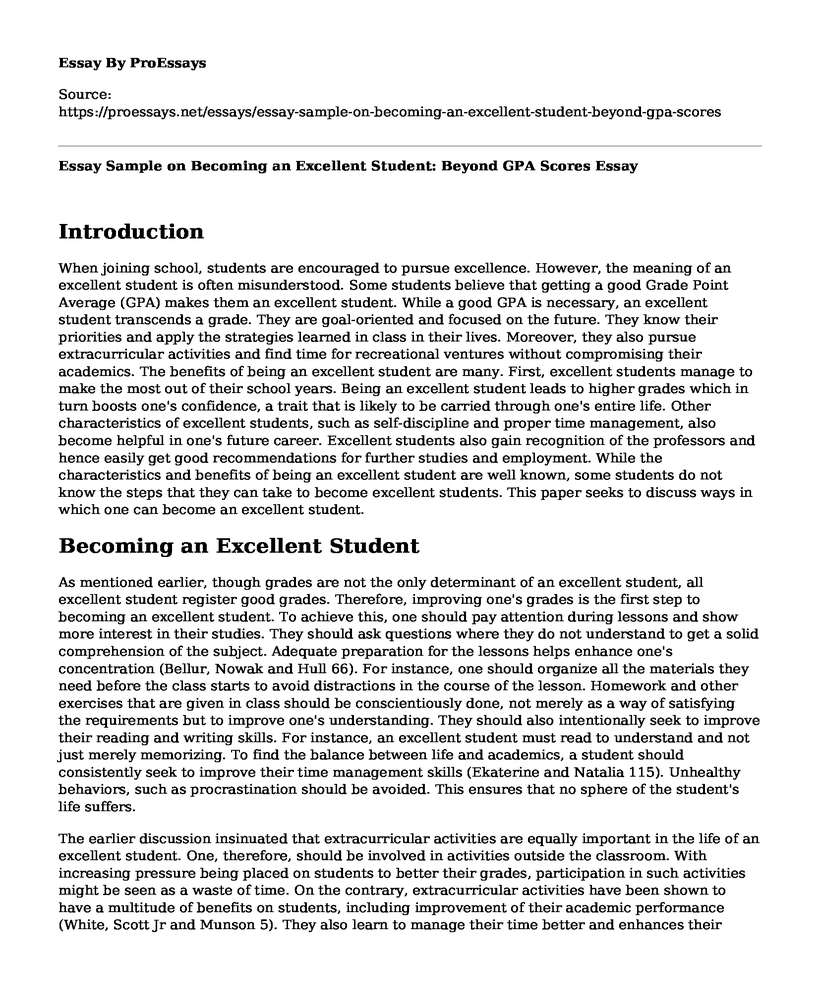Introduction
When joining school, students are encouraged to pursue excellence. However, the meaning of an excellent student is often misunderstood. Some students believe that getting a good Grade Point Average (GPA) makes them an excellent student. While a good GPA is necessary, an excellent student transcends a grade. They are goal-oriented and focused on the future. They know their priorities and apply the strategies learned in class in their lives. Moreover, they also pursue extracurricular activities and find time for recreational ventures without compromising their academics. The benefits of being an excellent student are many. First, excellent students manage to make the most out of their school years. Being an excellent student leads to higher grades which in turn boosts one's confidence, a trait that is likely to be carried through one's entire life. Other characteristics of excellent students, such as self-discipline and proper time management, also become helpful in one's future career. Excellent students also gain recognition of the professors and hence easily get good recommendations for further studies and employment. While the characteristics and benefits of being an excellent student are well known, some students do not know the steps that they can take to become excellent students. This paper seeks to discuss ways in which one can become an excellent student.
Becoming an Excellent Student
As mentioned earlier, though grades are not the only determinant of an excellent student, all excellent student register good grades. Therefore, improving one's grades is the first step to becoming an excellent student. To achieve this, one should pay attention during lessons and show more interest in their studies. They should ask questions where they do not understand to get a solid comprehension of the subject. Adequate preparation for the lessons helps enhance one's concentration (Bellur, Nowak and Hull 66). For instance, one should organize all the materials they need before the class starts to avoid distractions in the course of the lesson. Homework and other exercises that are given in class should be conscientiously done, not merely as a way of satisfying the requirements but to improve one's understanding. They should also intentionally seek to improve their reading and writing skills. For instance, an excellent student must read to understand and not just merely memorizing. To find the balance between life and academics, a student should consistently seek to improve their time management skills (Ekaterine and Natalia 115). Unhealthy behaviors, such as procrastination should be avoided. This ensures that no sphere of the student's life suffers.
The earlier discussion insinuated that extracurricular activities are equally important in the life of an excellent student. One, therefore, should be involved in activities outside the classroom. With increasing pressure being placed on students to better their grades, participation in such activities might be seen as a waste of time. On the contrary, extracurricular activities have been shown to have a multitude of benefits on students, including improvement of their academic performance (White, Scott Jr and Munson 5). They also learn to manage their time better and enhances their sense of commitment and responsibility. The activities also expose the students to new skills which could lead to the revelation of hidden gifts. This way, their opportunities increase (Jackson).
Conclusion
Every student should seek to attain excellence due to the several benefits associated with it. Determination to succeed, devotion, and time are needed for one to become an excellent student. The student should also seek to strike the delicate balance between academics and extracurricular activities since both are equally important. Success in both spheres is the primary determinant of an excellent student.
Works Cited
Bellur, Saraswathi, Kristine L. Nowak and Kyle S. Hull. "Make it our time: In class multitaskers have lower academic performance." Computers in Human Behavior 53 (2015): 63-70. <https://www.sciencedirect.com/science/article/pii/S0747563215004677>.
Ekaterine, Gulua and Kharadze Natalia. "Impact of Time Management on Personal Development of Master's Degree Students." European Journal of Social Science Education and Research 4.6 (2017): 110-118. <http://journals.euser.org/index.php/ejser/article/view/2750>.
Jackson, Nicole. "The Role of Extracurricular Activities in a Student's Development." 18 April 2017. The educator. 28 September 2019. <https://www.theeducator.com/blog/role-extracurricular-activities-students-development/>.
White, Tony, Lionel D. Scott Jr and Michelle R. Munson. "Extracurricular activity participation and educational outcomes among older youth transitioning from foster care." Children and Youth Services Review 85 (2018): 1-8. <https://www.sciencedirect.com/science/article/pii/S0190740917306114>.
Cite this page
Essay Sample on Becoming an Excellent Student: Beyond GPA Scores. (2023, Feb 13). Retrieved from https://proessays.net/essays/essay-sample-on-becoming-an-excellent-student-beyond-gpa-scores
If you are the original author of this essay and no longer wish to have it published on the ProEssays website, please click below to request its removal:
- Comprehensive Early Reading Plan - Education Essay Example
- Gorge Orwell's 1984 and Language Essay
- The Process of Nurturing the Infants: Creating Space for the Baby Essay
- Essay Example on Explore Europe's Alphabet Systems
- Essay Example on Unite Mindfulness & SEL for More Impactful Learning
- Paper Example on Uplifting Lives: Community Education's Unseen Role
- A Strategic Leadership Plan: A Personal Vision, Mission, and SMART Goals - Essay Sample







